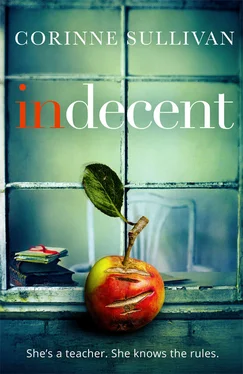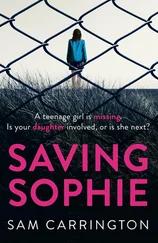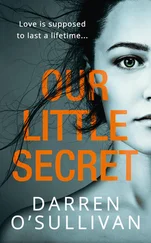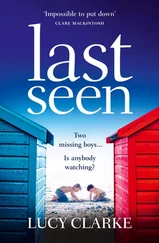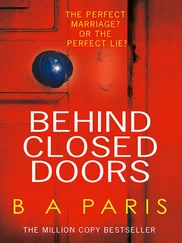I crossed the room to get the notes from my desk and returned to my bed. I sat against the headboard, the covers pulled up over my lap, an invalid awaiting visiting hours. “Welcome to Honors World History,” I said to the room. “I am your teacher, Miss Abney.”
_ _ _
It rained the next day, a cold damning rain, and the boys tracked wet footprints up the stairs and into the halls of the academic buildings. My hair was a crown of frizz around my face, and my ballet flats squelched with each step. “You must be Imogene,” said Call-Me-Dale when I walked into the classroom, coming around his desk to greet me.
I took his hand. “Nice to meet you, Dr.—”
“Dale.”
“Dale, right. Dale.”
Dale was tall and angular, with long, thinning hair pulled back into a ponytail, wild eyes, and a wide grin. He could have been thirty-five or fifty-five. He bounced on his heels as I set down my bag, a little kid with a secret or a full bladder.
“Now, Imogene, that’s an interesting name. Are you named for the daughter of King Cymbeline?”
He grinned as he asked this. I felt bad letting him down. “I’m sorry, who?”
His grin persisted. “Shakespeare’s Cymbeline . Imogen is the princess of Britain, known for her moral purity, unable to be seduced by Iachimo, who bets he can woo ‘any lady in the world.’”
My skin felt hot. “Oh. No, I think my parents just liked the name.”
“Well, that’s fine, just fine. It’s a lovely name.” He winked, and I felt a thump between my legs; attraction was still sometimes indistinguishable from discomfort for me. “Now, Imogene. Tell me how excited you are.”
“Um—”
“It’s thrilling, isn’t it?” Dale swept his hand around the classroom, to the four neat rows of desks with hinged tops that lifted to store students’ books inside and the beautiful vintage world map that took up almost the entire back wall and the enormous bay windows streaming light from the courtyard. “Being here, at one of the most prestigious preparatory institutes in the nation, helping to shape the young minds of the future. It’s really something.”
It occurred to me that Dale might be gay, and perhaps that he was on drugs as well. It didn’t matter to me; I felt I loved him already nevertheless. This was a bad habit of mine, falling in love. A few days before, on my morning run through town, I had spent the better part of a mile trailing a guy with yellow running shorts, keeping just a few paces behind him. He had impossibly long, wiry legs and feathered brown hair, and I matched my pace to his until he suddenly veered off the path into the woods. I imagined us going on runs together in the morning, panting beside one another as we jogged through town, until we finally stopped at our favorite coffee shop to get egg sandwiches and kiss. On weeknights we’d lie in my narrow bed, legs entangled, and watch classic films (he’d been a film major in college, I decided, a Hitchcock aficionado), and on the weekends we’d go into the city to see art exhibits and eat ethnic food we’d never even heard of but wanted to try, and we’d take goofy pictures of ourselves that would hang in the West Village apartment we’d move into together to remind us, always, of how we first began.
I never even saw his face.
“Yeah,” I agreed. “It is really something.”
The bell rang for third period, and the boys began to filter into the classroom. The first few entered in silence, choosing desks near the front. As the clock ticked towards the start of class, the rest of the boys filtered through the doorframe, chatting and laughing but still respectfully hushed. I watched as they settled in like eggs in a carton, so charmed that I nearly missed the exchange between the last two to enter.
“Sack slap!” jeered one boy as he whacked his friend up between his legs with an open palm. His friend doubled over as the slapper slid into the last available seat in the back row. “Dammit, Marco,” the friend scowled. It stunned me, this childishness; I hadn’t been there long enough to know that the boys I’d seen in the pages of the pamphlet—the boys I’d imagined marching in orderly lines and quietly sipping their soup—did not actually exist, at least not outside the eye of teacher supervision. I glanced at Dale; he hadn’t noticed the exchange, or at least willfully refused to see it. The behavior wasn’t hidden from me, however; I felt cool to not illicit censor, as though I was part of the joke.
“Greetings, gentlemen.” Dale took his place at the podium in the front of the room. “Welcome to Honors World History. Welcome to Vandenberg. Welcome to the first day of the rest of your lives.”
Someone let out a half-hearted whoop! from the back of the class.
“I am Dr. Duvall”—only I, the fellow adult, could call him Dale—“and I will be leading you this semester with the help of my assistant, Miss Abney.”
“Hello, Miss Abney,” a guy with a pink-and-green polka-dot tie intoned by the windows. His voice was mocking, insular.
I gave a timid wave to the classroom. These were not the susceptible, open faces of the elementary school students I was used to. One of the boys had a dark shadow of stubble on his chin. Another had an angry blotch of boils on his forehead. I’d wanted this, students old enough to reflect and respond rather than parrot back memorized information like trained dogs, but I’d forgotten that I was a subject they would reflect upon and respond to as well. Before the boys’ condemnatory eyes I felt as authoritative as a cup of plain yogurt.
Dale launched into a monologue about his career as a commercial artist, his experience in the military as a parachutist, his chihuahua/dachshund hybrid—a “Chiweenie”—named Maxine. The speech was craftily nonchalant, spoken as though off-the-cuff—I could tell he had been doing this, earning the respect of adolescent boys, for longer than he let on. He cursed in places— how cool, a teacher who says ‘fuck!’ —and made theatrical pauses in others. He commanded the class like someone accustomed to praise.
As Dale weaved through the aisles passing out syllabi, I unzipped my rain jacket (realizing just then that I had never taken it off) and set it on the floor by his desk. I’d printed out world maps for the boys to mark with famous early hominid finds and their locations—Dale had said he would allow me ten minutes at the end of each of his lectures to do an activity with the students—but the printouts had become crinkled in my book bag. Shame tightened my throat—for my wrinkled papers, for my squeaky shoes, for my frizzy hair, for my inability to command this room and to shape the young minds of the future.
“Hey, Dale?” I asked, hesitantly at first and then louder, “Dale?”
He turned to face me, halfway down the third row. The boy in the polka-dot tie turned to his friend beside him and waggled his brows. “Dale?”
“Yes, Miss Abney?” The pointedness with which he said my name made me think that perhaps “Dale” was not how he was to be addressed in front of the students. The room shifted to face me, fifteen scathing sets of eyes.
“Can I run down to the copy room? It seems that, um . . .” I held up one of my crinkled worksheets like an apology.
“Of course, of course.” His grin returned, and with it I felt a rush of relief. Everything was going to be okay.
I collected my papers and squeaked down the hall. In the copy room, I smoothed the least-wrinkled sheet out on the photocopier screen and pressed the right buttons. The machine whirred to life. As the warm papers slid into the tray, I looked up and met my reflection in the window above the copier, checking to make sure my blemishes were still buried beneath makeup. I slid a hand over the frizz in my hair, the wrinkles in my blouse and noticed, as I did so, that my wet rain jacket had made my blouse go sheer, and that the outline of my sensible beige bra was on display for all to see, having become visible through the fabric.
Читать дальше
